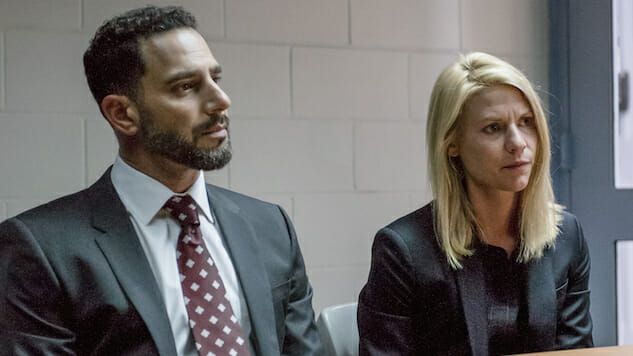With “Fair Game,” Homeland Returns Home to Set Up Another Slow Burn
(Episode 6.01)
JoJo Whilden/SHOWTIME
As spy thrillers go, the start of Homeland’s sixth season—the first set primarily in the United States in more than four years—is remarkably uneventful, bordering, at times, on the mundane. Of course, this has been the series’ stratagem since the death of Nicholas Brody in Season Three’s cathartic “The Star”: Eight episodes unspooled, with tightening screws, before the spellbinding tarmac exchange of the fourth season’s “There’s Something Else Going On”; last season, eight passed before “The Litvinov Ruse” revealed Miranda Otto’s Allison Carr to be her pursuers’ cool, crafty equal. In other words, Homeland has long since embraced the slow burn, emerging as a sober, patient drama—24 adapted for premium cable, a sort of stripped-down anthology from the failed War on Terror. In this sense, as German philanthropist Otto Düring (Sebastian Koch) says of an initiative to protect Muslims in New York from law enforcement discrimination, “Fair Game” may seem “small potatoes,” but Homeland has re-earned my trust enough to ask me to wait for the feast.
Leading up that initiative is Carrie Mathison (Claire Danes), three months after stopping a sarin gas attack on the Berlin subway in the Season Five finale. As stable as we’ve seen her since “Super Powers,” in which she goes off her medication in hopes of untangling the conspiracy to assassinate her, Carrie’s relationships with the men in her life are still strained. Koch’s indecent proposal continues to shadow their interactions—his sidelong glance at Carrie’s handsome colleague, Reda (Patrick Sabongui), is as telling as her feigned enthusiasm at his surprise visit—while Quinn (Rupert Friend), in the midst of in-patient physical therapy at a local VA hospital after sarin poisoning, bristles at her daily presence. “The hardest time, when you can’t go on one more second, that’s when you have to keep going,” Carrie says to her longtime ally, as he expresses his fear that his condition’s not improving. “That’s when breakthroughs happen.”
One can imagine being unmoved by Carrie’s stubbornness, which might explain why she and Saul (Mandy Patinkin) remain—so it seems—on the outs. This isn’t likely to last forever: Theirs is among the most fraught mentorships on television, an action-adventure analogue to Mad Men’s Don Draper and Peggy Olson, and as such, each one needs the other to thrive. Plus, it’s clear Saul has fallen out of favor at the CIA, even with frequent collaborator Dar Adal (F. Murray Abraham). Dar fears that the new president-elect, New York Sen. Elizabeth Keane (Elizabeth Marvel, also known as House of Cards’ Heather Dunbar), is planning to roll back top-secret U.S. intelligence operations; for his part, Saul sees Keane as “persuadable,” perhaps chastened by the stern lessons of seasons past.
In fact, as Homeland continues to whittle away the memory of the Brody family, to deepen its interest in the real-life evolution of the War on Terror, the series itself has grown circumspect, too. If Season Four considered the consequences of the drone wars, and Season Five the calamitous failure of the West’s policies in Syria—both of which play out, at embassies and Hauptbahnhofs, in Islamabad and Berlin, as the blowback of violent extremists—then Season Six promises a reckoning with the real meaning of “Homeland Security.” Forget the faint connection that one might draw between Keane and Hillary Clinton, an attempt at timeliness that’s since curdled into something of a distraction: The unifying principle in “Fair Game” is doubt, as Carrie, Saul, and the incoming president each evince skepticism of the rulebook they’ve been reading since 9/11. “If the war isn’t winnable,” Keane asks Dar at one point, “what are we still doing there?”
-

-

-

-

-

-

-

-

-

-

-

-

-

-

-

-

-

-

-

-

-

-

-

-

-

-

-

-

-

-

-

-

-

-

-

-

-

-

-

-








































